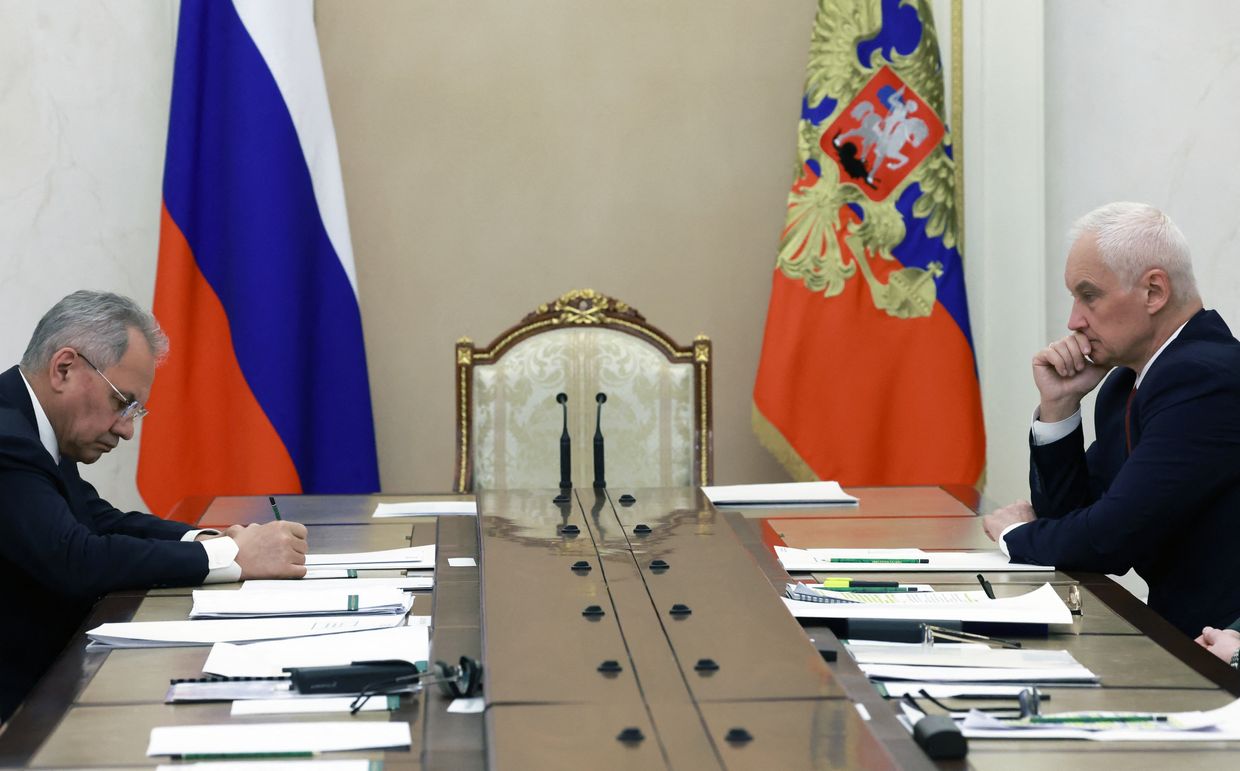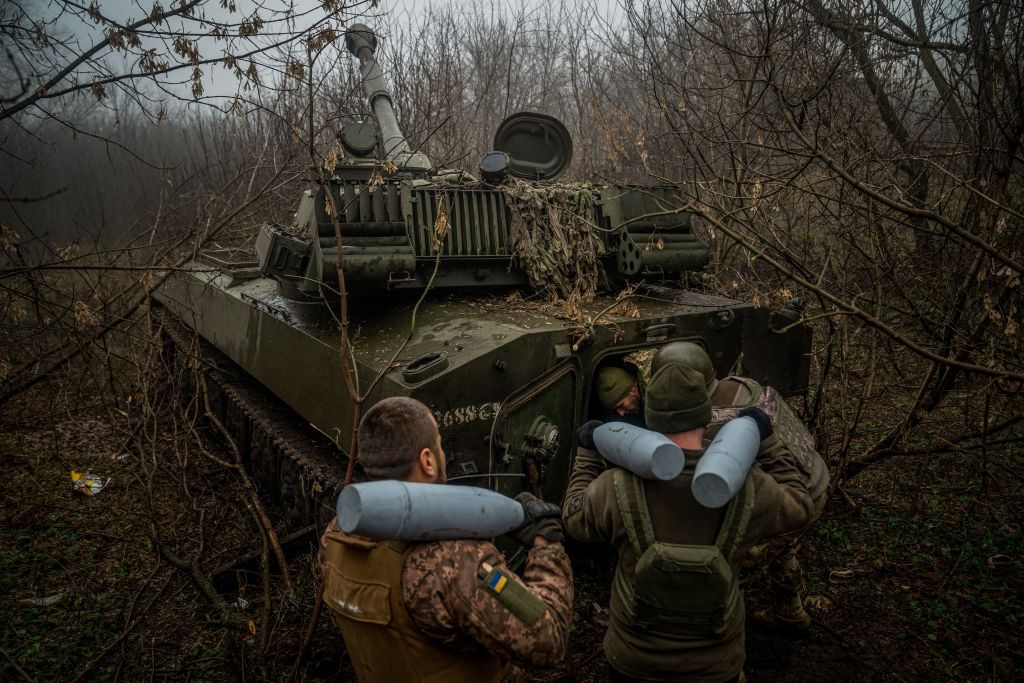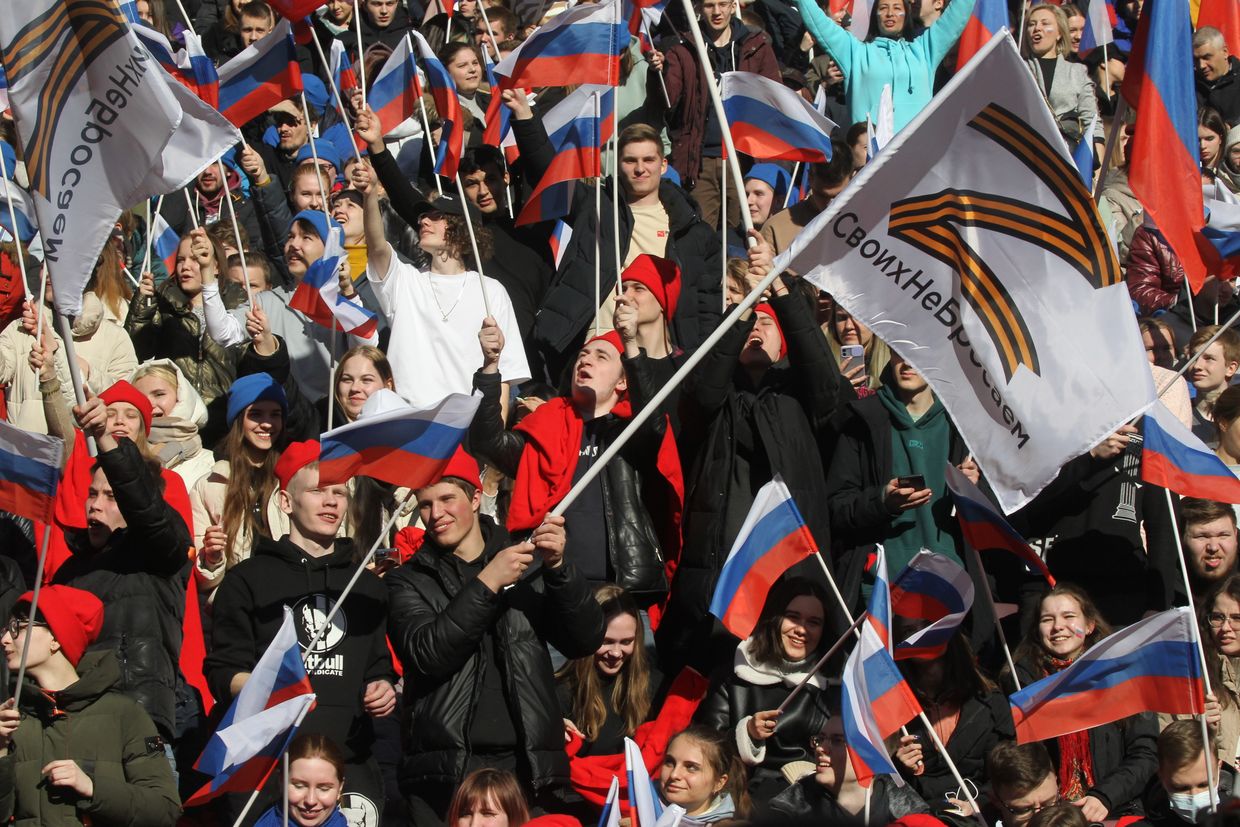As Russian losses in Ukraine hit 500,000, Putin buries future demographic risks at home
Behind the figure lies a potential demographic and economic time bomb that Russian President Vladimir Putin may not be able to ignore so easily.

A man digs a grave near tombs of Russian soldiers at a cemetery in the town of Yefremov in the Tula region on March 23, 2023. (For illustrative purposes) (Natalia Kolesnikova/AFP via Getty Images)
According to Ukraine's General Staff, over half a million Russian soldiers were either killed or wounded in Ukraine during the 27-month-long full-scale war.
The staggering number is in line with the estimates of the U.K. and France, which said earlier in May that the overall Russian losses are set to be around 500,000.
"We estimate Russian military losses at 500,000, including 150,000 deaths," French Foreign Minister Stephane Sejourne said on May 3.
Russia's aggression with little regard for the lives of its own soldiers is likely to continue, but behind the figure lies a potential demographic and economic time bomb that Russian President Vladimir Putin may not be able to ignore so easily.
What are the latest figures?
According to Ukrainian figures, as of May 25, Russia has lost 500,080 troops. The figures from the General Staff of Ukraine's Armed Forces do not specify killed or wounded.
The overall consensus is that it includes dead, wounded, missing and captured.
In February, Zelensky said that 180,000 Russian troops had been killed since the start of the all-out war. The president said that over 31,000 Ukrainian soldiers were killed during the same time.
Western officials gave similar estimates about Russian battlefield losses.
Speaking to Russian independent newspaper Novaya Gazeta Europe, Sejourne said: "Russia's military failure is already apparent."
Leo Docherty, British minister of state for the Armed Forces, said in late April the U.K estimates Russian losses to be over 450,000.
“We estimate that approximately 450,000 Russian military personnel have been killed or wounded, and tens of thousands more have already deserted since the start of the conflict," Docherty said in parliament.

"The number of personnel killed serving in Russian private military companies (PMCs) is not clear," he added.
A U.S. estimate reported on Dec. 12 put the total at 315,000. On the same day, the Ukrainian figure was 340,650.
How accurate are the figures?
Ukraine has published daily estimates of the number of killed and wounded Russian soldiers since the early days of the launch of the full-scale invasion.
Initially there was some skepticism about how accurate the numbers were, reflected in the fact Western nations were at first reluctant to publish their own numbers.
"At the start of the war when I was in Moscow we didn't speculate on numbers because there was a lot of propaganda flying around," John Foreman CBE, the U.K.'s former defense attache in Moscow from 2019 to 2022, told the Kyiv Independent.
"But it seems to me that over the last year and a half or so the British, American and Ukrainian estimates have all come together."
Over the course of the full-scale invasion, Ukraine's Western allies did begin to publicly release their own estimates of Russian losses and they are broadly in line with those coming out of Kyiv.

An ongoing open source investigation by Mediazona, a Russian independent media outlet, together with BBC Russia, put the number of confirmed dead Russian soldiers at 52,789.
The authors note that the actual figures are likely significantly higher, as their verified information comes from public sources such as obituaries, posts by relatives, regional media reports, and statements from local authorities.
Russia has not disclosed the losses of its Armed Forces in Ukraine since September 2022, meaning the official Kremlin death toll still stands at just 5,937. Even then, the number was brushed off as a severe under-report.
Just how big are 500,000 losses?
"Half a million killed and wounded is a huge figure," says Foreman.
If confirmed, France's 150,000 figure of Russian troops killed is around 10 times higher than that suffered by the Soviet army during the decade-long war it fought in Afghanistan from 1979 until 1989.
For comparison, the U.S. military lost around 102,000 soldiers killed in all the wars it fought since the end of World War II, including 58,220 during the Vietnam War.
The U.K. suffered 750,000 military casualties during the six years of the Second World War.
And Russia's losses show no signs of slowing – in fact, they've reached record levels in recent weeks.
Moscow lost the most number of soldiers in a single day since the start of the full-scale invasion – 1,740 – on May 12, according to Ukraine's General Staff.
According to an analysis on the Ukrainian figures by analyst Ragnar Gudmundsson, eight of the top ten bloodiest days for Moscow's forces since the launch of the full-scale invasion all occurred this month.
"The army that went into Ukraine has been totally hollowed out," says Foreman. "So it's had the effect of changing a professional army into a semi-professional, conscript army and you've seen decreasing quality as the number of deaths has gone up."
Does the Kremlin care?
Earlier this month, Putin appointed a new defense minister, with Andrei Belousov replacing the long-standing Sergei Shoigu.
In a speech laying out his priorities for his new role, economist Belousov said his "key task, of course, remains achieving victory."
"At the same time - I want to specifically emphasize this - with minimal human losses," he added.
According to the Financial Times, Russia may be forced to launch a new mobilization wave by the end of 2024.
Foreman also suspects there is a far more callous calculation behind Belousov's statement.
"I don't think he's a particularly altruistic guy, he's not doing it for the lives of the soldiers," he says, adding: "I think what he's indicating there is that the cost to the Russian government of all these killed and wounded is colossal."
In December 2023, Putin signed a decree promising to pay 5 million rubles ($55,450) to the families of soldiers killed in Ukraine, and 3 million rubles ($33,270) to those wounded.
And at the start of the full-scale invasion, Putin said the families of those killed would be paid a "statutory insurance coverage and a lump sum payment of 7,421,000 rubles ($82,298)," as well as "a monthly compensation will be paid to every family member of the dead."
While the exact amount paid out is not known, Bloomberg estimated in a piece about soldier compensation payments last year that "outlays for people in the military, including volunteers and those who were mobilized, may total around 1.1 trillion rubles ($12 billion) per year."
And then there are the social costs – rates of PTSD and alcohol and drug addiction among Russian soldiers returning home have surged, as well as murder and violent crime incidents involving veterans.
"It's a balance sheet calculation," Foreman says in reference to Belousov's comments.
"Obviously now there are things like casualty compensation payments to families of dead and injured, the murder rate increase and increase in PTSD, alcoholism, domestic violence, which are all linked to lots of people coming back wounded or traumatized from the front."
Added to this are the inevitable labor shortages caused by men either fleeing the country to avoid serving in the army, or being killed or wounded when they do.
"It all adds up to another demographic time bomb which I think is going to blow its way through Russia in the next 10-20 years," says Foreman.
Will it affect the war in Ukraine?
Despite the horrific death toll, Russia appears to be still attracting recruits eager to sign up.
According to the country's defense ministry, more than 100,000 men signed contracts to serve during the first three months of the year.
Politically, Putin is fresh from another dubious election victory and shows no signs of abandoning his aims in Ukraine.
But the longer term picture for Russia is far from rosy, Foreman says.
"Putin's mortgaging his entire country's future for his war in Ukraine," he says. "I think long-term calculations about Russia's long-term health and viability have been completely sacrificed.
"It doesn't matter bizarrely how much he's gone through, maybe half of all the military's materiel or 500,000 people, or all the long-term macroeconomic problems that have been sown, you've got the situation now where he has to win this. Russian leaders who lose wars end up faring badly, so he's all in," Foreman says.
"Now if Ukraine can hang on after all the dithering and delay in Washington, deal with mobilization, sort out its training, and continue to bleed the Russian army, then I think there's a chance to bring the problem home to Russians."













